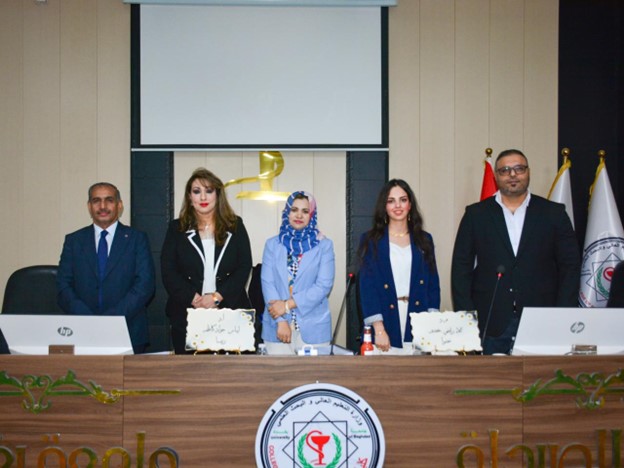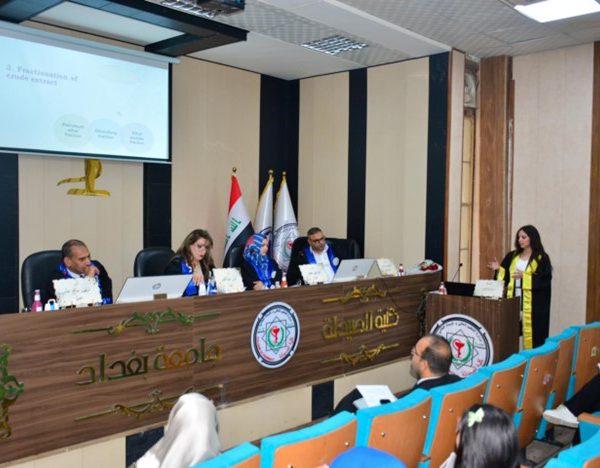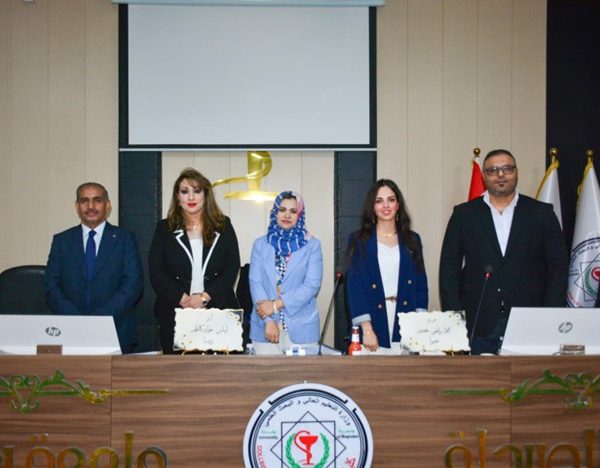The College of Pharmacy discussed the MSc thesis entitled “Phytochemical investigation and assessment of the possible hepatoprotective effect of Plumbago auriculata L. cultivated in Iraq” by the student Massara Nazar Ahmed and the supervisor, Assistant Professor Dr. Amjed Haseeb Khamees, at the Pharmacognosy and Medicinal Plants Department.The study aimed to investigate the phytochemicals of Plumbago auriculata L. cultivated in Iraq and to evaluate the hepatoprotective effect of the methanolic extract against carbon tetrachloride (CCl4)-induced hepatotoxicity in mice, since there was no previous study concerning this cultivated Iraqi species.The study included extraction of chemicals using Soxhlet apparatus after removing fat using hexane solvent for 72 hours with replacement of solvents three times (every 24 hours). The crude methanolic extract was then divided using solvents with different polarities, and then the extracts were screened using preliminary chemical tests, thin layer chromatography (TLC), and high-performance liquid chromatography (HPLC) to detect the different chemical components. The active components were isolated using preparative layer chromatography (PLC) and preparative high-performance liquid chromatography (PHPLC) and their characteristics were determined using thin layer chromatography (TLC), spiking analysis by preparative high-performance liquid chromatography, infrared spectroscopy (FT-IR), liquid chromatography-mass spectrometry (LC/MS/MS) and proton nuclear magnetic resonance (1HNMR). The hepatoprotective activity was evaluated after detection of the median lethal dose (LD50) of the methanolic extract. The mice were divided into four groups and treated intraperitoneally once daily for seven days, then biochemical and histopathological analyses were performed for all groups. The results showed the presence of phytosterols, naphthoquinones, flavonoids, and polyphenols in Plumbago auriculata. Four compounds were isolated and identified, including sigmasterol, luteolin, ferulic acid, and a new naphthoquinone. The study showed that the median lethal dose (LD50) was 3.1 g/kg and that a dose of 500 mg/kg of the methanolic extract significantly reduced the activities of alanine aminotransferase (ALT) and aspartate aminotransferase (AST) compared to the carbon tetrachloride model group. Histopathological analysis of the extract revealed a decrease in pathological features compared to the carbon tetrachloride-intoxicated group. The study recommended the need for further studies to identify other compounds that have not yet been identified in this plant. There is a need for a quantitative study to estimate the amount of each component and compare these components with the same plant grown elsewhere. It also requires identifying the main biologically active components responsible for the hepatoprotective activity in the plant, in addition to the need to conduct other pharmacological studies to clarify other reported/unreported pharmacological activity in Plumbago auriculata cultivated in Iraq.





